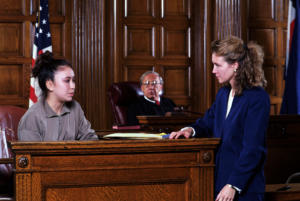
Your Right to a Trial by Jury
As an accused in a criminal prosecution you have a number of important rights and privileges that are guaranteed to you by the U.S. Constitution. Most of those rights are found within the first ten Amendments to the Constitution, collectively known as the “Bill of Rights.” Your right to a trial by jury is located in the 6th Amendment. Like all of your rights, your right to a trial by jury is your right to exercise or to waive. If you decide to exercise your right to a trial by jury, you will have to select a jury to hear the case.
Who Are the Prospective Jurors?
When the court is notified that a defendant wishes to have the case decided by jury trial, the clerk’s office is also notified. A random list of names is then generated from the Department of Motor Vehicle records. Those people are sent a summons ordering them to appear for jury duty on the date and time specified on the summons. These people make up the prospective jury pool, though only a small fraction of them will actually make it onto the final jury.
Voir Dire — Questioning the Prospective Jurors
Some courts require prospective jurors to fill out a juror questionnaire ahead of time while others have the prospective jurors fill it out on the morning of the trial. The questionnaires typically ask basic questions such as the person’s occupation, education, and other general information as well as asking if the individual knows anyone involved in the case and other questions intended to determine if the person is disqualified for cause. A disqualification for cause means there is a legal reason why the prospective juror cannot serve on the jury.
The bailiff will bring in an initial group of prospective jurors for questioning, formally referred to as “voir dire.” Sometimes the judge will ask questions before the attorneys while in other courts the judge asks very few questions. Both the prosecutor and the defense attorney may then ask questions of the jurors. The purpose of the questions is twofold. First, the questions are intended to elicit information that would amount to a disqualification for cause, such as bias or previous knowledge of the facts of the case. The second reason is for both sides to get a feel for the individual in an effort to decide if they want the individual to remain on the jury. It is for this reason that you might hear apparently irrelevant questions such as “What is the last book you read?” or “What is your favorite movie?” These questions tell an experienced attorney much more about a person than most people realize. The answers to these questions are used to decide who to excuse using “peremptory challenges.” Each side has a set number of peremptory challenges in Tennessee, as follows:
- Death Penalty Case – 15 peremptory challenges per defendant for both the prosecution and the defense.
- Imprisonment for more than one year (felony) case — 8 peremptory challenges per defendant for both the prosecution and the defense.
- Imprisonment for less than one year (misdemeanor) case — 3 peremptory challenges per defendant for both the prosecution and the defense.
A peremptory challenge may be used to excuse a juror for any reason the attorney wishes, except for a discriminatory reason. As prospective jurors are excused, other are brought in and the questioning continues until both sides have used up their challenges. At that point, the people who remain in the courtroom make up the final jury who will hear the case.
Contact a Murfreesboro Criminal Defense Attorney
If you have additional questions or concerns about jury selection, or about criminal defense in general in the State of Tennessee, it is in your best interest to consult with an experienced Murfreesboro criminal defense attorney immediately. Contact the team at Bennett, Michael & Hornsby today by calling 615-898-1560 to schedule your appointment.
- The Art of Successful Co-Parenting During Divorce - April 19, 2024
- Elder Financial Exploitation: How to Protect Seniors - April 12, 2024
- How to Obtain Guardianship of a Minor in Tennessee - April 2, 2024




